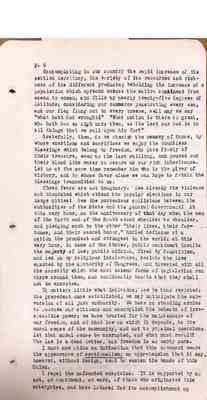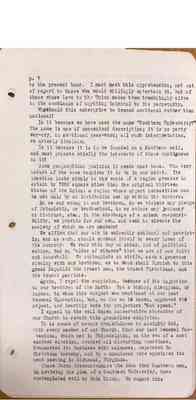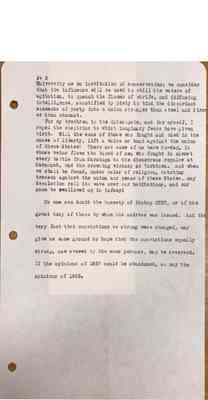Pages That Need Review
Vault Early Papers of the University Box 2 Document 13
3
p. 3
history of the flag used on the occasion.
The flag, was made, he said, by the ladies of that city where our independence had its birth. The staff was cut by Millard Fillmore when President of the United States, from near the grave of Washington, and presented, at his request, to the owner by Lieut. Gen. Scott. This flag had been borne at the mast of one of our national vessels, it had waved upon the breezes of Europe and of Asia, of the Mediterranean and the Nile; its folds had been displayed upon the lonely Sinai, and amid the sacred localities of Jerusalem.
Such was the banner under which we rallied. At the conclusion of these remarks, "The Star Spangled Banner" was played by the band.
The Rt. Rev. James H. Otey, D. D., Bishop of Tennessee, then stood forth as the Orator of the day; his address appears upon these pages, and forms the most valuable portion of this record.
Various emotions were stirred as the Rt. Rev. Speaker uttered his earnest words. The reference, with which he happily began, to St. Paul's claim to Roman citizenship, reminded us all that the patriot was not of necessity lost in the Christian; that holding aloft the cross of Christ, we need not blush to place it beneath the Stars and Stripes; that after the echoes of the hills had been awaked with the
4
p. 4
loftiest strains of Christian praise, it is not unfitting to bid them presently give back the animating notes of freedom's songs.
No Christian could fail to sympathize with the speaker in his positions, that ours is a government intended for Christian people, not for Mormons and Atheists, and that beneath all law must lay the great foundation of public virtue and the fear of God. None could fail to catch somewhat of his enthusiasm, as he not so much borasted, as confessed with words and gestures of humblest gratitude, the benign and conservative influence which the Church, whose vows are upon us, has always exercised in our land; as he spoke of the work to be done in this nation, and of the members of the Protestant Episcopal Church as the men to do it.
Thus far the flag hung idly from its staff; but when the Bishop began to speak of our country and the love all good men bear it, a breeze came to stir the Stars and Stripes; and still, as he proceeded to denounce the thought, that we would come with holy words upon our lips to plot mischief against our brethren, the flag waved more proudly that before, seeking the person of the speaker, and causing his words to come as it were from the midst of its folds. As the oration progressed, warm tears filled many an eye, and
5
p. 5
would not be repressed. At its close, the band struck up "Hail Columbia," and the company rose to their feet. Many hastened to thank the orator for the just expression he had given to their sentiments, then all dispersed, and might be seen in friendly groups still prolonging the pleasant theme.
Bishop OTEY's address, as printed and circulated by the board contained the following remarkable passages:
If any people upon the earth may refer the distinguished privileges, which they possess, to the favoring hand of God, we are that people. When we review the prominent events of our history , we realize that the hand of the Lord has wrought mightily and wondrously for us;that it was he who endued our counsellors with wisdom, and our warriors with courage, to meet in conflict one of the most formidable powers of the earth, and to pass with success and honor through the dangers of so perilous an encounter, to the achievement of Independence; to the high and glorious distinction of a name and a place among the nations of the earth.
A little more than seventy years (the period allotted to the age of man) have passed away, since the clouds of war rolled darkly over all out land, the thunders of battle reverberated along our hills, and the crimson vesture of the plains showed where brethren had met in mortal strife. A nation's freedom was the prize for which they struggled. The God of armies beheld the contest, discerned its merits, and determined on which standard victory should rest.
These expectations have been largely fulfilled. We are all of us here to-day witnesses for our fathers, that they have done well for us in all that they have done. We are, also, witnesses for God, in the acknowledgment we make of his favor extended to them, and continued to ourselves. If my tongue ever denies this debt of gratitude, "may my tongue cleave to the roof of my mouth!" If my hand ever refuse to strike in defence of our birthright of civil and religious freedom, secured by the sacrifices of our Fathers and the blessing of God to my countrymen, "may mine arm fall from my shoulder-blade, and mine arm be broken from the bone!"
6
p. 6
Contemplating in our country the rapid increase of its settled territory, the variety of its resources and richness of its different products; beholding the increase of a population which spreads across the entire continent from ocean to ocean, and fills up nearly twenty-five degrees of latitude; considering our commerce penetrating every sea, and our flag flung out to every breeze, well may we say "what hath God wrought!" "What nation is there so great, who hath God so nigh unto them, as the Lord our God is in all things that we call upon him for?"
Gratefully, then, do we cherish the memory of those, by whose exertions and sacrifices we enjoy the countless blessings which belong to freedom, who gave freely of their treasure, even to the last shilling, and poured our their blood like water to secure us our rich inheritance. Let us at the same time remember him who is the giver of victory, and by whose favor alone we can hope to retain the blessings transmitted to us.
These fears are not imaginary. See already the violence and bloodshed which attend the popular elections in our large cities! See the portentous collisions between the authorities of the State and the general Government! At this very hour, on the anniversary of that day when the men of the North and of the South stood shoulder to shoulder, and pledging each to the other "their lives, their fortunes, and their sacred honor," hurled defiance at a nation the proudest and strongest in the world: at this very hour, in some of the States, public sentiment insults the majesty of law; public opinion, fired by fanaticism, and led on by religious intolerance, resists the laws enacted by the authority of Congress, and invested with all the sanctity which the most solemn forms of legislation can throw around them, and confidently boasts that they shall not be executed.
It matters little what individual law be thus resisted: the precedent once established, we may anticipate the subversion of all just authority. We have no standing armies to overawe our citizens and accomplish the behests of irresponsible power: we have trusted for the maintenance of our freedom, and of that law on which it depends, to the moral sense of the community, and not to physical coercion: let that moral sense be corrupted, and what must result? The law is a dead letter, and freedom is an empty name.
I must now ntice an intimation that this movement wears the appearance of sectionalism; an apprehension that it may, however, without design, tend to weaken the bands of this Union.
I repel the unfounded suspicion. It is supported by no act, or sentiment, or word, of those who originated this enterprise, and have labored for its accomplishment up
7
p. 7
to the present hour. I must meet this apprehension, not out of regard to those who would willingly entertain it, but of those whose love to the Union makes them tremblingly alive to the semblance of anything inimical to its perpetuity.
Why should this enterprise be deemed sectional rather than national?
Is it because we have used the name "Southern University?" The name is one of convenient description; it is no party war-cry, no sectional pass-word; all such interpretation, we utterly disclaim.
Is it because it is to be founded on a Southern soil, and must promote chiefly the interests of those contiguous to it?
Some geographical position it needs must have. The very nature of the case requires it to be in our midst. Its location looks simply to the wants of a region greater in extent by 7820 square miles that the original thirteen States of the Union: a region whose urgent necessitites can be met only by an institution set up within its borders.
Do we any wrong to our brethren, do we violate any pledge of friendship, or brotherhood, do we evince any jealousy or distrust, when, in the discharge of a solemn responsibility, we provide for our own, and seek to elevate the society of which we are members?
We affirm that our aim is eminently national and patriotic; and as such, should commend itself to every lover of his country. We rear this day an altar, not of political schism, but an "altar of witness" that we are of one faith and household. We contemplate no strife, save a generous rivalry with our brethren, as to whom shall furnish to this great Republic the truest men, the truest Christians, and the truest patriots.
Again, I repel the suspicion, because of its injustice to our brethren of the North. Not a bishop, clergyman, or layman, to whom this subject was mentioned at our last General Convention, but, so far as its known, approved the object, and heartily bade its projectors "God speed."
I appeal to the wll known conservative character of our Church to rebutt this groundless suspicion.
It is cause of devout thankfulness to Almighty God, with every member of our Church, that our last General Convention, which met in Philadelphia, on the eve of a most excited election, avoided all disturbing questions, transacted its business with calmness, separated in Christian harmony, and by a unanimous vote appointed its next meeting in Richmond, Virginia.
These facts discountenance the idea that Southern men, in devising the plan of a Southern University, have contemplated evil to this Union. We regard this
8
p. 8
University as an institution of conservatism: we consider that its influence will be used to still the waters of agitation, to quench the flames of strife, and diffusing intelligence, sanctified by piety to bind the discordant elements of party into a union stronger than steel and firmer than adamant.
For my brethren in the Episcopate, and for myself, I repel the suspicion to which imaginary fears have given birth. Will the sons of those who fought and bled in the cause of liberty, lift a voice or hand against the union of these States? There are some of us here to-day, in whose veins flows the blood of men who fought in almost every battle from Saratoga to the disastrous repulse at Savannah, and the crowning victory at Yorktown. And when we shall be found, under color of religion, hatching treason against the union and peace of these States, may desolation roll its waves over our habitations, and our name be swallowed up in infamy!
No one can doubt the honesty of Bishop OTEY, or of the great body of those by whom his address was issued. And the very fact that convictions so strong were changed, may give us some ground to hope that the convictions equally strong, now avowed by the same persons, may be reversed. If the opinions of 1857 could be abandoned, so may the opinions of 1863.
Vault Early Papers of the University Box 2 Document 14
Vault Early Papers of the University Box 2 Document 2
1
RG[I?] BOT
1 Ways & Means Bp of Texas, Rev. Dr [Sanders?] Mss[rs?] Wh[itel?], Thompson ^Polk & Pe[gues?]
2 University Organi[za?]he[n?] Bp. of Alabama, Bp. of Tenn Rev Dr [Williams?] Rev. Dr. Ba[nnister?] & [Mr?] Pe[gues?]
3d Buildings & Lands Mss[rs?] Ke[nshaw?], De Ropet? & Race
4 Board & Boarding [Houses?] Bp. of So. Ca. Rev. D. Lawson, W. [F?]itts
5 Salaries Bp. of La, Bp of Texas ^Rev W [Gorlis?], D[r.?] De Ropet & [Mr?] [Thomps?]
[6?] Sanitary Measures Bp. of Tenn, Rev. D[r?] S[cott?], Col. Race
7 Pro[positions?] and Grievances - Rev. Dr G[reene?] R and [Mr?] Thompson
Vault Early Papers of the University Box 2 Document 23
1
Chattanooga 6 Dec 1860
Mr. J. D. Alexander
Dear Sir
We have [written?] you a time or two since forwarding bill lumber you ordered in Sept last but have th[us?] far not succeeded in even receiving a simple reply to our fa[vors?]_
We are very rarely treated thus by our friends And we consider it rather hard in Yr. Case [&?] we put ourselves to considerable incon[venience?] to fill yr. order _
We now need money & need it badly Will you not remit [us?] the Amt. of the Bill [s?]ay four Hundred & Seventy seven ($477.00) dollars _ Int[erest?] ought to be counted now nearly 3 mos. but if









